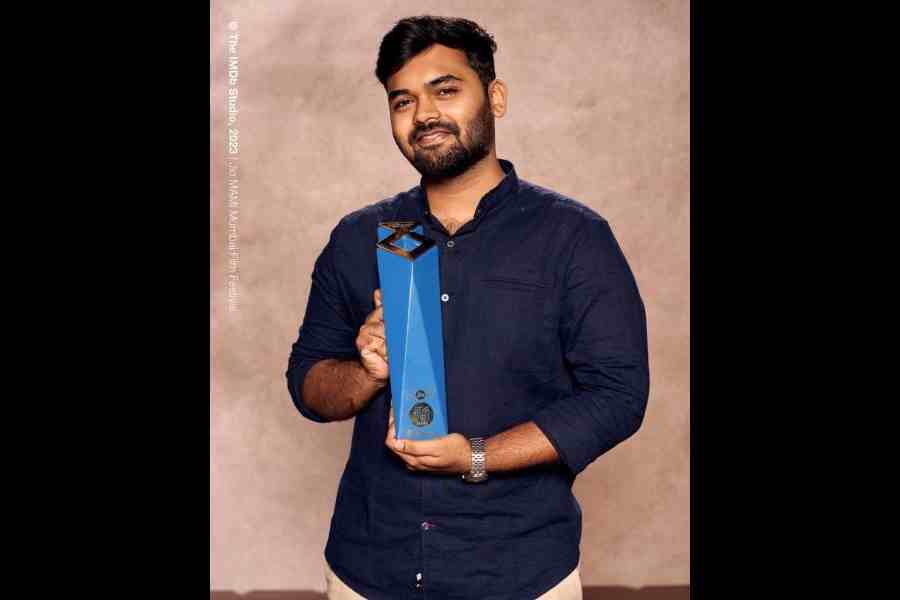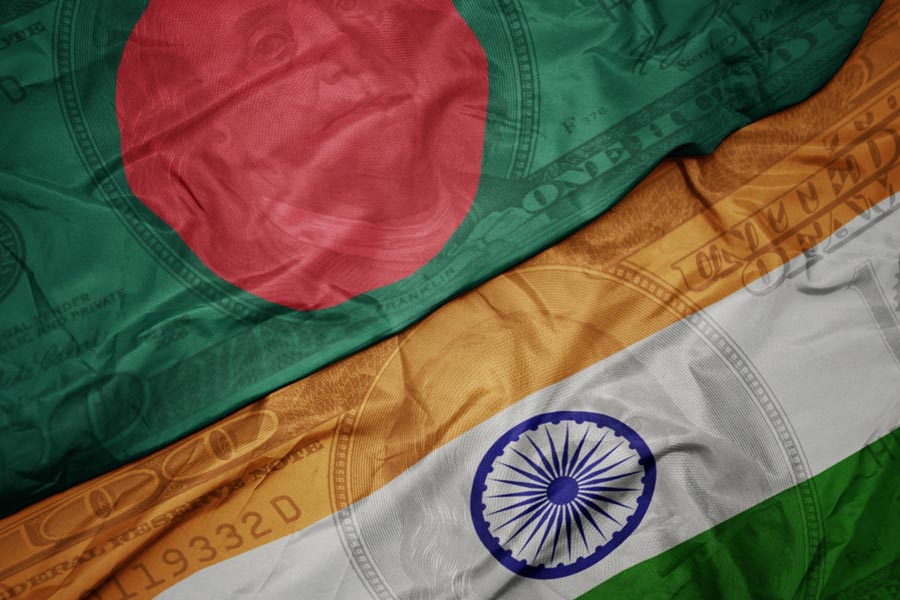Kumar Chheda, whose short film Halfway was recently screened by the British Council all over India as part of the Five Films for Freedom project, has garnered accolades and appreciation for his beautifully profound directorial debut. Ahead of the Calcutta screening and just hours before he had to leave for London to have his film screened at Westminster Palace, t2 caught up with Kumar over Zoom. Excerpts:
Congratulations on having your film selected for Five Films for Freedom this year! How does it feel?
It’s quite wonderful. Honestly, when you start making a short film, you don’t really expect it to be showcased anywhere. You probably just think your friends are going to watch it or something. I don’t really know about anyone else but I feel that being selected for a programme like Five Films for Freedom and being showcased by the British Council really makes your film accessible to the entire world. But even more important I feel it is the initiative it stands for. Love is a human right, something that my film had in its inception. When we started building it, that was one of the core things that we worked on. And being selected for this programme was perfectly in tandem with that theme, so it was the best place we could show this to the entire world. There’s nothing and nowhere better I could have expected or hoped for. And the opportunities that I’ve been getting through this initiative are wonderful. Every filmmaker wants their film to be seen by the entire world, and it’s obviously very difficult to make that happen. Even if I make a feature tomorrow, I don’t believe I’m going to get a pan-India release. But with an initiative, with a programme like this, it really is the stuff of dreams. Plus, it’s my directorial debut, so that’s just the icing on the cake. I don’t think I can ask for anything else.
And you’re the only Indian director whose work is part of Five Films this year. That must be an enormous honour in itself…
Yes, definitely. It makes you so grateful for the things that are happening in your life, you know? The other films are also superb, really brilliant, so having your work showcased with those kinds of films really elevates your own. It’s like being in the presence of great filmmakers and you’re a kind of leverage by yourself. It truly feels amazing.
Tell me about the concept and the thought behind Halfway. While watching, I couldn’t help but get the feeling that you were trying to express some very deep, serious thoughts through simple words and actions…
The idea was to talk about a relationship. Since I have entered adulthood and I have seen what love is, there’s a love-hate relationship that I’ve had with love itself. It’s like a mystical feeling that I’ve never really understood completely. And this specific moment that the film takes place, the moment in the relationship that the film happens in, I feel like that moment is something that has happened to me quite a lot of times. It’s like your relationship is at a moment where you don’t really know if it’s going to work or not, you don’t know if you should be making an effort or not, both of you are still in love but you don’t really know what to do exactly in this situation.
And I feel placing it on a beach is a perfect way to encapsulate all of that. I’m sure you’ve been to Bombay and Juhu Beach and you know how many entrances there are to the beach, right? So, the idea was to have them be in the same area but on different pages. That they’re at the same space, wanting the same things, but they are in different places and that is what was happening in the relationship. And making it a queer story was something that the story itself gave to me. I was talking to my collaborators, my music producer, my cinematographer, and that idea itself just started developing — that the story is so relatable that you and I and everyone else at some point is going to feel like: “Maybe I’m that character. Maybe I’m that person in the film.” I wanted it to push the idea of normalising a queer relationship and looking at it through the lens of every other relationship that a person can be in. Love is love and love has no boundaries. I feel like when I see myself in characters that I might not necessarily relate to or entirely understand the idea of, but I still feel like the character is me — that’s what does the job, pushes the narrative, the idea, starts a conversation.
Halfway has already touched a lot of hearts, because it won Silver Award for Best Film (Dimensions) at JioMAMI 2023. Tell us what that experience was like.
That I think was the biggest surprise of all. Okay, maybe Five Films is the biggest surprise of all (laughs), but winning an award like that was something that I absolutely had never expected. And obviously, they don’t reveal that you’re going to win until the end, right? So, I went to the award ceremony and what happened was that the other people who were nominated in my category had seats at the back, and my seat was in the second row with the biggest celebs like Deepika (Padukone) and Ranveer (Singh) and everyone else. So, I was sitting there and thinking “What?!! What am I doing here?! How have I landed up here?!” And then I felt like: “Okay, I think something big is going to happen.” It was amazing. But all that I could think of that night was the fact that awards might not change anything I’m doing or my career trajectory, but what it does is that it gives me and my work a sense of credibility. That people can sit and think that I could actually be bringing something credible to the table. So yeah, it’s wonderful.
Now that the film is being showcased to a wider audience, what are you hoping for? Would you say there are any specific takeaways that you would like to leave viewers with at the end of the film?
I’m really hoping that a lot of queer people come to see the film. It’s made for them but it’s also made for everyone else. What I really, really wish for people to take away from the film is for them to have the hope to fall in love again. I wish people feel a little bit of love again. The hope of love working out is something that I feel is diminishing from this world. You’ll see so many stories of people who have been in relationships that are not working out anymore, or you might be in such a space yourself, and I just hope that a film like Halfway gives people a little bit of hope, that maybe love can work out despite obstacles. And obviously, there’s this idea of normalising a queer relationship and seeing it through the lens of any other relationship that I would ever see. Equality. Love is love. That’s the idea.
Halfway is a love story. But knowing Indian society today, any kind of representation of queer cultures is met with its fair share of murky waters. How does it feel to be creating art like this in a society that is still far from ideal when it comes to accepting the queer community?
I mean, it’s like what you said. Halfway is a love story. The aspect of the queer story came later. I’m a deeply political filmmaker and I think Halfway is the least political film I’ve ever made. I’ve never shied away from talking about stuff that is not accepted. I think cinema is a reflection of society and the mass reach that it has is a responsibility while also being a tool to serve entertainment. But when we’re telling a story like Halfway, what really works out for it is that it’s a love story that has a political theme. But you don’t see the political statement first, because it’s dressed up as a love story, and the political statement it makes is something that is going to stay at the back of your mind rather than come to the forefront. My personal belief is that change comes from within. You have to work within the system, within the limitations that you are in and try to build the best you can from that space. So, yes, there may be censorship from society about a certain topic, but I feel like if you’re smart enough and willing enough to encapsulate the idea that you’re trying to portray in a story that is palatable and digestible by the wider audience, then it’s a sure way to make a change. I can show a story like Halfway anywhere I want, and people are first going to see it as a love story. It being a queer story comes much later. So that is what I think works best for me. That’s how I feel these difficult waters need to be navigated — saying something through the lens or shadows of something that is completely acceptable and ordinary.











